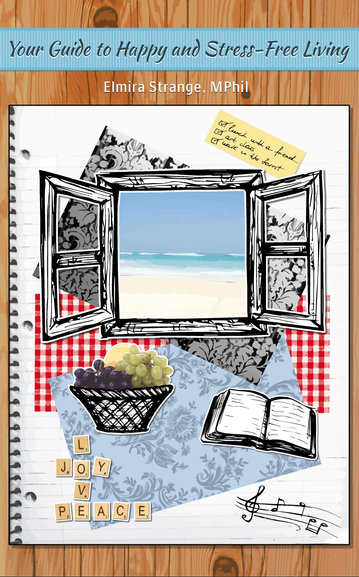Best ways to manage stress:
Use your mind
- What’s the difference between stress, tension and panic?
- Stress is when wife is pregnant,
Tension is when girlfriend is pregnant, and
Panic is when both are pregnant.
(A joke)

by Elia Strange
Best Ways to Manage Stress
Most people have to deal with stress on daily basis.
Whether you got stressed because of an argument with someone in your family, traffic jam on the way home, or because you could not fit everything you planned in one day, the stress levels you are getting can seriously damage your health.
In my other article “Signs and Stages of Stress” I explained that damage from stress depends on the level of stress you are getting. To find out what stage of stress you might be in at the moment, read “Signs and Stages of Stress”, if you haven’t done already.
In this article I’ll discuss the best ways to manage stress as recommended by psychologists around the world. Here they are:
Repressive Coping
This type of managing stress is characterised by avoiding situations or thoughts that are reminders of a stressor and maintaining an artificially positive viewpoint.
When you use repressive coping, you actually are trying to banish the negative thoughts from your mind, whilst ‘repressing’ the reality. Or in other words, when you use repressive coping, you may actually avoid thinking about the situation (that made you stressed) altogether.
For some people it may be impossible, but others might find it fairly easy – to control their own thoughts or simply ‘banish’ the unpleasant thoughts altogether.
Psychologists say that this way of coping with stress should be used short-term only.
You probably know a person who is always seem to be cheerful and positive, who never complains about anything, and who welcomes negative situations and people with a smile. Even though it may be annoying to see someone who is that positive about life, these are actually the people who use repressive coping on the daily basis.
Basically, they deliberately ignore problems and they prefer to see the world in rose-tinted spectacles.
If you are familiar with the book or a movie ‘Gone with the Wind’, then you will probably remember Scarlet O’Hara, the main heroine, who liked to use this approach of managing her stress by saying ‘I will think about it tomorrow’ when she faced stressful situations.
Can you use this way to manage your stress?
Well, if you are having a difficulty of controlling your thoughts and find yourself complaining quite often, then you are not a very good candidate for this approach.
However... It is possible to train yourself to think more positively, stopping yourself before talking negatively about anything, not getting involved in gossips and complains with others whenever it is possible, and changing your inner dialogue with yourself to the more encouraging one (i.e. as if you are talking to your best friend).
This is the way you can use this method time to time.
The downside: This approach might be harmful if using it for a long time, as some researchers found (e.g. Suls and Fletcher, 1985; Wegner and Pennebaker, 1993).
Avoiding reality can limit the ‘real’ world you live in. And, you don’t actually deal with your problems.
The benefits: By using this method from time to time, you can reduce your overall stress levels to a minimum. You might even see people complain less and less when you are nearby when they see your positive approach.
Even though you don’t deal with the actual problems when using this method (because you are ignoring them), you might actually notice that some problems get simply solved without your intervention anyway.
Rational Coping
Rational Coping involves facing the stressor and working to overcome it. This approach is the opposite of the Repressive Coping, because with this approach you actually have to face your fears (and stressors).
To use Rational Coping you need to follow the following 3 steps:
1) Acceptance – understand that the stressful situation (or a person) won’t vanish because you wish for it. The problem/stressor is still there, and you need to deal with it however difficult it may seem.
2) Exposure – looking for a thing (situation, person, etc.) which causes your stress actively (or on the daily basis). Think about it. Reflect on it.
3) Understanding – trying to understand what and why is causing your stress. Attempt to find some meaning in the stressful situation.
This way of managing stress might seem to be impossible to some, especially if the stressful situation caused you some serious psychological trauma. But if you are trying to deal with a daily stress (i.e. arguments with others, busy and hectic life, etc.), this approach may the best of all in terms of using it long-term.
The downside: As a said earlier, with some traumatic situations this approach may be too painful to put into practice. Also, sometimes it is not necessary to look for a meaning in certain situations, it’s easier to just let them go.
The benefits: It is a good method to use long-term and for the most stressful situations in your life. Once you used the 3 steps mentioned above, you can definitely reduce the amount of stress you get from stressful situations. And in a very rational way.
Reframing
If you find yourself getting stressed because of the situation you are in, try to imagine a different scenario of this situation in your mind.
For example, you argued with one of your family members, and of course, it hurts. Now, try to imagine that the argument didn’t really happen, or happened with someone else and not with you, or not with this particularly family member but someone else. See the situation from 'outside'.
Try to switch off your emotions for a moment, just observe as an 'outsider'. This can help you to see the situation as 'not that important' anymore.
Or, let’s say you got stressed because you had many things to do today, and the friend (or your partner) you relied on for help didn’t help you at all. Your children don't want to do what you told them to do, and your friend changed all the plans and cannot see you tonight as she promised earlier.
Now try to imagine that your life is actually not your life at all. This life belongs to someone else, and you just trying it out for few days (like perhaps in 'Wife Swap' tv programme). You might even feel sorry for the person you are replacing at the moment. He (or she) has to deal with it on the daily basis. Whereas you are – an independent and a very kind individual, who agreed to try out someone else's life for a week.
After spending several minutes doing this task , you might find that the stressful situation is not that ‘real’ anymore. And again, you can detach yourself from the situation, see it as an 'outsider', and think of what you need to do to reduce this type of stress in your life.
The downside: When you are using this way to manage stress, you might detach yourself from the reality a bit too much. As with Repressive Coping, it can limit the real world you live in.
The benefits: It can be the most enjoyable way to deal with the problem (well, if you can say that). It helps if you like to fantasise often anyway. Also, you can develop your creative skills and talents when using this approach from time to time.
In summary, people often try to manage their problems by trying to suppress their negative thoughts or by avoiding stressful situations. Such repressive coping is not particularly effective for most people, because they simply avoid the problem / stressor, which usually doesn't go away.
The best long-terms options are the "rational coping" (where you face the problem and reflect on it) and "reframing" the situation so you could see it in a different light and make the needed changes.
References:
Nolen-Hoeksema, S. (2008). Abnormal Psychology. (4th ed). Butcher, J.N., Mineka,
S., Hooley, J.M. (2007). Abnormal Psycholgy. (13th ed.)
Davidson, G.C., Neale, J.M., & Kring, A.M. (2004) Abnormal Psychology. (9th ed.)
Other Articles you might like:
Reduce your Stress
Stress and your Health
Stress and your Sleep
What to do when you are stressed?
Am I depressed? (Test)
How well can you cope with stress? (Quiz)
Mindfulness (for stress reduction)

Sign
up below to receive my free email newsletter with new fresh articles to
help you to become healthier and happier.
It's sent about once a month.
No spam. No
sharing of your email address. Easily unsubscribe at any time.
Best Articles:
10 tips to strengthen your marriage
Best ways to manage your stress
How to get what you want (the Law of Attraction)
Why do I need to eat healthy?
Signs and stages of stress
13 Facts about sugar addiction
7 Reasons for our unhappiness
Why people commit suicide
How to get a good night sleep
Try these Tests and Quizzes:
Is it time to take stress seriously?
How well do you know yourself?
Can you talk to teenagers?
Do you have a time to recreate?
Can you cope with stress well?
The Latest Articles:
Green Smoothie Recipe
Stress in Parents and Carers of disabled children (VIDEO)
Did you find your dream job yet?
Is an eye mask good for sleeping?
How to look and appear confident
Why am I tired all the time?
Exercise tips: 8 easy ideas for losing weight and become fitter
15 Sure signs that you are stressed
Are memory foam mattresses worth it?
How stress affects your health: What stress is doing to your body
How to get what you want (the Law of Attraction)
How to be more patient
How to deal with SAD: Autumn depression
How to stop negative thinking
How bad is your memory? (Fun Quiz)
What is love - in children words
How to make people like you?
Why do I forget things?
10 Tips to strengthen your marriage
Would you move abroad?
Are holidays worth it?



